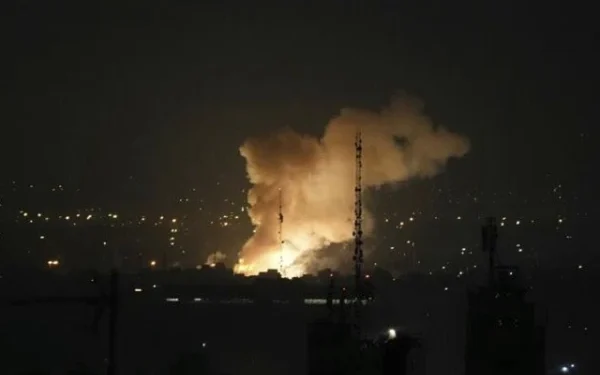Overview of the Escalating Tensions Between Israel and Iran
In a shocking escalation of hostilities in the Middle East, Israel has launched a series of targeted airstrikes on Iran, hitting what it claims are key components of Iran’s nuclear program and military infrastructure. The strikes reportedly resulted in the deaths of several high-ranking Iranian military officials, including the chief of the Islamic Revolutionary Guard Corps (IRGC), Hossein Salami, and Iranian Chief of Staff General Mohammad Bagheri. Additionally, prominent Iranian nuclear scientists Farid Abbasi and Mohammad Mahdi are also said to have been killed.
While Iranian authorities have yet to release an official statement, the international community is on high alert, fearing that these developments could spark a broader regional conflict with global implications.
Israel Confirms ‘Operation Rising Lion’
Israeli Prime Minister Benjamin Netanyahu officially confirmed the launch of “Operation Rising Lion,” a military campaign aimed at what he described as dismantling the Iranian nuclear threat. In a televised address, Netanyahu stated:
“A few moments ago, Israel launched Operation Rising Lion, a strategic military initiative designed to push back the Iranian threat, which we believe has reached existential proportions.”
Netanyahu emphasized that the operation will continue until the “proliferation is completely eliminated”, suggesting a prolonged and extensive campaign. He added that recent Iranian advances in nuclear technology could enable Tehran to build a nuclear weapon in a matter of months—or even sooner.
Defense Minister Declares National Emergency
Following the strikes, Israeli Defense Minister Israel Katz announced a state of emergency across the country, warning that retaliatory action by Iran is imminent. The declaration has heightened national security measures, particularly in cities such as Jerusalem, where air raid sirens sounded and mobile phones buzzed with emergency alerts in the early morning hours.
Citizens were urged to remain indoors and avoid public gatherings as the government braced for a possible Iranian counterattack. Security forces have been deployed in large numbers, and Israel’s Iron Dome missile defense system is reportedly on full alert.
Explosion Reports and Ground Impact in Tehran
According to American and Israeli media outlets, several loud explosions were heard across Iranian cities, including the capital Tehran. Videos circulating on social media appear to show flashes of light in the sky, smoke rising from targeted areas, and emergency services responding to chaotic scenes.
Though Iranian state television has not confirmed the reported deaths, the suspension of all commercial flights at Tehran’s Imam Khomeini International Airport suggests that the Iranian government is treating the situation with utmost seriousness. The airport, located approximately 30 kilometers southwest of the capital, is considered a critical infrastructure asset.
Key Iranian Figures Reported Martyred
Foreign media reports indicate that several of Iran’s most important military and scientific leaders have been martyred in the airstrikes, a claim that, if confirmed, would mark one of the most significant single-day losses for Iran’s leadership in recent history.
Reported Casualties Include:
- Hossein Salami – Commander-in-Chief of the IRGC
- General Mohammad Bagheri – Chief of Staff of Iran’s Armed Forces
- Dr. Farid Abbasi – Senior nuclear scientist
- Dr. Mohammad Mahdi – Prominent physicist working on advanced centrifuge design
The loss of these individuals, particularly the nuclear scientists, could severely disrupt Iran’s nuclear progress and increase national outrage, potentially forcing Tehran to retaliate militarily.
The Strategic Importance of Iran’s Nuclear Program
Iran’s nuclear ambitions have been a flashpoint in Middle Eastern politics for decades. The Joint Comprehensive Plan of Action (JCPOA), commonly known as the Iran nuclear deal, was signed in 2015 to limit Iran’s ability to enrich uranium in exchange for sanctions relief. However, the U.S. withdrawal from the deal under President Donald Trump in 2018 led to its effective collapse.
Since then, Iran has gradually resumed uranium enrichment activities, bringing it closer to weapons-grade capability. Israeli officials have consistently viewed this as a red line, with Prime Minister Netanyahu often warning the international community of the dangers posed by a nuclear-armed Iran.
Emergency Response from the United States
In response to the unfolding situation, former U.S. President Donald Trump reportedly convened an emergency cabinet meeting. While Trump is not currently in office, his involvement indicates the deep geopolitical ramifications of the crisis. Current U.S. President Joe Biden and other Western leaders are also expected to issue statements urging restraint and diplomatic resolution.
Given the United States’ historical support for Israel and strategic interests in the region, the Pentagon has placed U.S. military assets in the Middle East on heightened alert, preparing for potential fallout that could impact American troops, embassies, and citizens.
International Reaction and Fears of Broader Conflict
The airstrikes have prompted immediate concerns from the international community. European Union officials, the United Nations, and countries including Russia, China, and Turkey have expressed grave concern over the potential for a wider regional war.
Key Global Concerns Include:
- Possible Iranian retaliation targeting U.S. or Israeli interests abroad
- Threats to the safety of international shipping lanes in the Strait of Hormuz
- Destabilization of neighboring countries like Lebanon, Syria, and Iraq, where both Israeli and Iranian proxies are active
- Escalation involving other regional players like Saudi Arabia, the UAE, and Qatar
UN Secretary-General António Guterres has urged both sides to exercise “maximum restraint” and emphasized that “diplomacy must prevail over warfare.”
Potential Iranian Response: Retaliation or Diplomacy?
Although Iran has not yet issued an official response, military analysts expect a measured but firm retaliation. Iran possesses an arsenal of long-range ballistic missiles and maintains influence through allied militias in Lebanon (Hezbollah), Iraq (PMF), Syria, and Yemen (Houthis).
If Iran retaliates directly or through its proxies, the conflict could spiral into an all-out regional war, drawing in multiple state and non-state actors. Some experts warn that such a war could disrupt global oil supplies, cause mass civilian casualties, and lead to long-term destabilization in the Middle East.
Implications for the Future of the Middle East
This latest confrontation has deepened the chasm between Iran and Israel, but more critically, it has brought the region to the edge of a potential war. While both sides may aim to avoid a full-scale conflict, the high-profile nature of the casualties and the symbolism of the targets struck could make diplomatic de-escalation extremely difficult.
The coming days are likely to be critical. The world will be watching closely to see whether Iran chooses the path of revenge or restraint, and whether the United Nations or influential nations like China, Russia, and the United States can broker a ceasefire or dialogue before the crisis spins further out of control.
Conclusion: A Region on the Brink
The Israeli airstrikes on Iran have changed the dynamics of the Middle East overnight. With senior Iranian military and scientific leaders reportedly killed, the stakes have never been higher. Both countries are now on high alert, and the international community must act swiftly to prevent a broader regional war. The coming hours and days may very well determine the future of peace—or conflict—in one of the world’s most volatile regions.

























